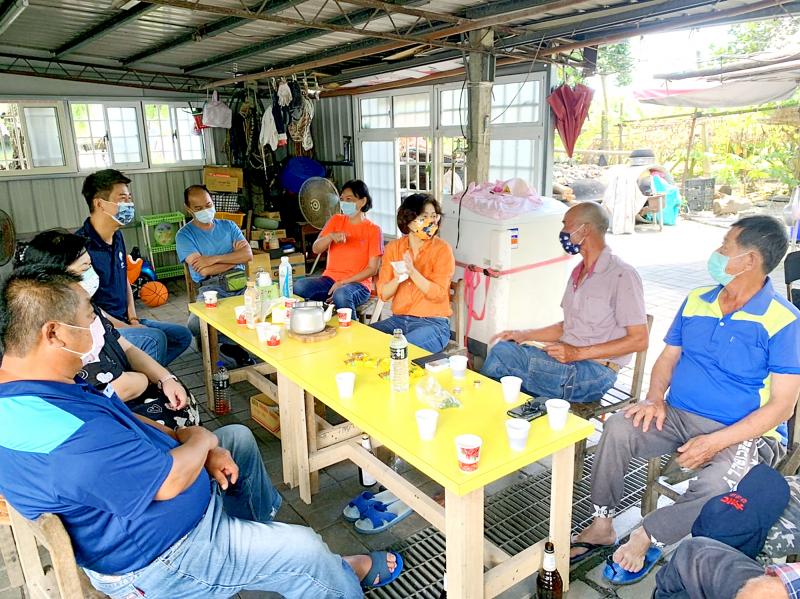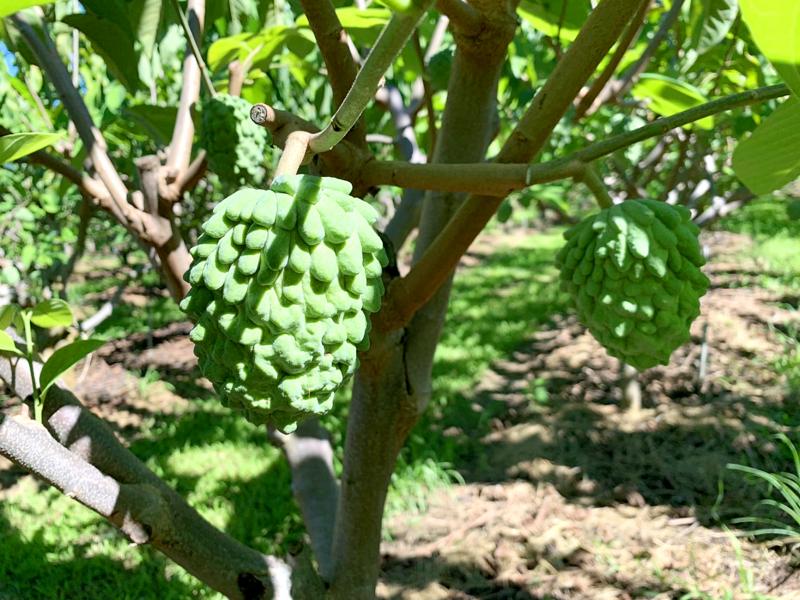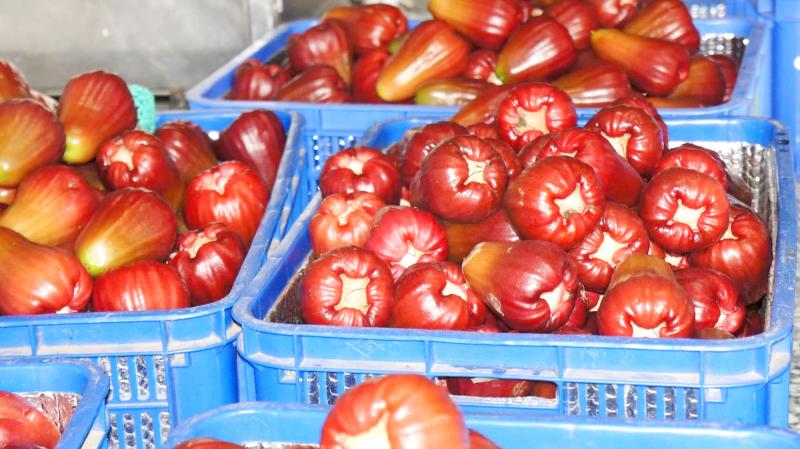The government does not have a double standard for China and New Zealand when responding to bans on Taiwanese fruit, Council of Agriculture (COA) Minister Chen Chi-chung (陳吉仲) said yesterday, adding that anyone making such an accusation is ignorant of international trade regulations.
On Sunday, Chen said that Beijing’s ban on imports of wax apples and custard apples from Taiwan was “unacceptable,” vowing to settle the dispute through the WTO should Beijing continue to ignore requests for trade negotiations.
However, some people accused Chen of applying a different standard when Wellington in June banned imports of lychees and mangoes from Taiwan due to pest concerns, at which time he said that he “respected” the New Zealand government’s decision.

Photo: CNA
Those who have accused the government of having double standards are completely ignorant of regulations governing international trade, Chen wrote on Facebook.
Rules governing exports and imports of animals and plants between two countries are stipulated through bilateral negotiations, he said.
“For example, we have agreed that lychees exported to New Zealand must be steamed at 46.5°C for 20 minutes. After we were notified about the pest concerns in June, both countries began to negotiate a solution to the issue. Exports of Taiwanese lychees and mangoes to New Zealand will resume once an agreement is reached,” he said.

Photo courtesy of the Taitung County Government
However, China has not responded to Taiwan’s negotiation requests, not for the pineapple import ban in March, or the recent ban on wax apples and custard apples, Chen said, adding that Beijing’s consistent breach of international trade regulations is unacceptable.
“Taiwan and New Zealand are following international trade regulations and settling the dispute through proper procedures. We seek to enforce inspection and quarantine measures based on scientific evidence, while minimizing damage to bilateral trade,” Chen said.
“However, China has been ambushing us by unilaterally banning imports of pineapples, wax apples and custard apples, which all took effect the day after the announcement. China simply issued announcements not backed by any objective evidence,” he said.

Photo courtesy of the Kaohsiung City Government
China claimed that citrus mealybugs were found in wax and custard apples from Taiwan, but such pests exist in Taiwan, China and other Asian countries, Chen said.
Fruits found to have citrus mealybugs are allowed into a country as long as they are fumigated with methyl bromide, he said.
Only China uses the discovery of citrus mealybugs to block exports of Taiwan’s agricultural products, he said.
Wellington reported discoveries of oriental fruit flies, which lay eggs and parasitize fruits, Chen said, adding that adult fruit flies can fly and have a high risk of spreading.
Mealybugs have a lower risk of spreading and they do not affect the inside of fruits, Chen said.
“Plant inspection and quarantine is a scientific issue, not a political issue. China should quickly respond to our requests for negotiations, or we will have no other recourse but to settle the dispute through the WTO mechanism,” he said.

MAKING WAVES: China’s maritime militia could become a nontraditional threat in war, clogging up shipping lanes to prevent US or Japanese intervention, a report said About 1,900 Chinese ships flying flags of convenience and fishing vessels that participated in China’s military exercises around Taiwan last month and in January have been listed for monitoring, Coast Guard Administration (CGA) Deputy Director-General Hsieh Ching-chin (謝慶欽) said yesterday. Following amendments to the Commercial Port Act (商港法) and the Law of Ships (船舶法) last month, the CGA can designate possible berthing areas or deny ports of call for vessels suspected of loitering around areas where undersea cables can be accessed, Oceans Affairs Council Minister Kuan Bi-ling (管碧玲) said. The list of suspected ships, originally 300, had risen to about 1,900 as

Right-wing political scientist Laura Fernandez on Sunday won Costa Rica’s presidential election by a landslide, after promising to crack down on rising violence linked to the cocaine trade. Fernandez’s nearest rival, economist Alvaro Ramos, conceded defeat as results showed the ruling party far exceeding the threshold of 40 percent needed to avoid a runoff. With 94 percent of polling stations counted, the political heir of outgoing Costa Rican President Rodrigo Chaves had captured 48.3 percent of the vote compared with Ramos’ 33.4 percent, the Supreme Electoral Tribunal said. As soon as the first results were announced, members of Fernandez’s Sovereign People’s Party

MORE RESPONSIBILITY: Draftees would be expected to fight alongside professional soldiers, likely requiring the transformation of some training brigades into combat units The armed forces are to start incorporating new conscripts into combined arms brigades this year to enhance combat readiness, the Executive Yuan’s latest policy report said. The new policy would affect Taiwanese men entering the military for their compulsory service, which was extended to one year under reforms by then-president Tsai Ing-wen (蔡英文) in 2022. The conscripts would be trained to operate machine guns, uncrewed aerial vehicles, anti-tank guided missile launchers and Stinger air defense systems, the report said, adding that the basic training would be lengthened to eight weeks. After basic training, conscripts would be sorted into infantry battalions that would take

GROWING AMBITIONS: The scale and tempo of the operations show that the Strait has become the core theater for China to expand its security interests, the report said Chinese military aircraft incursions around Taiwan have surged nearly 15-fold over the past five years, according to a report released yesterday by the Democratic Progressive Party’s (DPP) Department of China Affairs. Sorties in the Taiwan Strait were previously irregular, totaling 380 in 2020, but have since evolved into routine operations, the report showed. “This demonstrates that the Taiwan Strait has become both the starting point and testing ground for Beijing’s expansionist ambitions,” it said. Driven by military expansionism, China is systematically pursuing actions aimed at altering the regional “status quo,” the department said, adding that Taiwan represents the most critical link in China’s